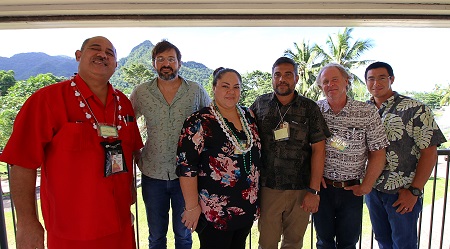
ASCC-ACNR Director Aufa’i Apulu Ropeti Areta, Dr. Clay Trauernicht (UHM-CTAHR), Dr. Particia Fifita (UHM-CTAHR), ASCC-ACNR Horticulturalist Dr. Ian Gurr, Dr. Jonathan Deenik (UHM-CTAHR), and Jensen Uyeda (UHM-CTAHR) during the last day of the Extension Climate Change Forum held at ASCC-ACNR. The Forum brought together local and regional experts from the agricultural, natural resource management, and climate and weather sectors to engage in a critical dialog around climate change and its potential impacts on agricultural and food security in American Samoa.

ASCC-ACNR Director Aufa’i Apulu Ropeti Areta, Dr. Clay Trauernicht (UHM-CTAHR), Dr. Particia Fifita (UHM-CTAHR), ASCC-ACNR Horticulturalist Dr. Ian Gurr, Dr. Jonathan Deenik (UHM-CTAHR), and Jensen Uyeda (UHM-CTAHR) during the last day of the Extension Climate Change Forum held at ASCC-ACNR. The Forum brought together local and regional experts from the agricultural, natural resource management, and climate and weather sectors to engage in a critical dialog around climate change and its potential impacts on agricultural and food security in American Samoa.
ASCC-ACNR & UH Manoa host Extension Climate Change Forum
July 2, 2018
By Daniel Helsham ASCC-ACNR
The American Samoa Community College (ASCC) - Agriculture, Community and Natural Resources (ACNR) Division and the University of Hawai’i at Manoa - College of Tropical Agriculture and Human Resources (UHM-CTAHR) Cooperative Extension Services hosted a two-day Extension Climate Change Forum: Sharing Climate Change Knowledge, Supporting Our Communities event on June 20 and June 21, 2018.
“The purpose of the Extension Climate Forums held in Hawaii and in the other U.S. Affiliated Pacific Islands, including American Samoa, was to bring together local and regional experts from the agricultural, natural resource management, and climate and weather sectors to engage in a critical dialog around climate change and its potential impacts on agricultural and food security on the islands,” said Dr. Patricia Fifita, Postdoctoral Research Fellow for UHM-CTAHR in the Department of Natural Resources and Environmental Management (NREM).
The Extension Climate Forums were first developed through the efforts of UHM-CTAHR Extension Specialist Dr. Clay Trauernicht and Extension Agent Jensen Uyeda, who designed a survey to assess climate-related knowledge and concerns within UHM Cooperative Extension. These efforts eventually led to Dr. Trauernicht, with Co-Principal Invetigators Dr. Jonathan Deenik and Dr. Rebecca Ryals from UHM-CTAHR, successfully obtaining funding from the U.S. Department of Interior, Office of Insular Affairs (OIA), UHM Cooperative Extension, USDA SW Climate Hub and the Pacific Islands Climate Change Cooperative (PICCC) to conduct research and develop a series of Climate Change Forums focused on agriculture for Cooperative Extension in Hawai'i and the U.S. Affiliated Pacific Islands.
Over the past year, a series of Extension Climate Forums have been convened in Hawaii, Guam and the Commonwealth of the Northern Mariana Islands. Each forum was designed and organized collaboratively with the support of local cooperative extension staff and local government and environmental agencies in each location. “A central goal of this project has been to build a partnership between the ASCC-ACNR Extension Services and the UHM Cooperative Extension Services to increase climate knowledge and access to climate-related information relevant to the agricultural sector, in an effort to identify strategies for strengthening local food production systems in the face of climate change,” said Dr. Fifita.
The visiting group from UHM-CTAHR consisted of Dr. Trauernicht, Dr. Deenik, Uyeda and Dr. Fifita. Local farmers and environmental agency partners were invited to attend the Forum. Environmental agency partners that attended the Forum included the Environmental Protection Agency (EPA), Department of Agriculture (DOA), Department of Marine Wildlife Resources (DMWR), Coral Reef Advisory Group (CRAG), National Park of American Samoa (NPAS), National Weather Services (NWS), National Oceanic and Atmospheric Administration (NOAA) and the National Marine Sanctuary Association (NMSA). ASCC-ACNR student interns and staff also took part.
The first day of the Forum, held at the Tauese P.F. Sunia Ocean Center, consisted of presentations regarding climate change impacts on agriculture, weather vs. climate, and climate change variables. Prior to the closing of the first day, the attendees were organized into groups for participative discussions on agricultural and environmental issues and solutions here in American Samoa. The second day of the Forum consisted of climate adaptation workshops regarding sustainable agricultural practices, maximizing yield production, and soil nutrients conducted at the ASCC-ACNR. After the workshops, Forum participants went on a tour of the ACNR compound, which included ACNR’s Agriculture Extension vegetable demonstration plots, Horticulture research laupele plot, Rain Garden plot, vetiver grass plot, Piggery Unit, Nature Trail, and the Center for Sustainable Integrated Agriculture and Aquaculture’s tilapia demonstration systems.
"The American Samoa Extension Climate Change Forum was a vital learning opportunity that brought together the expertise, research findings, knowledge, and experiences of professionals from UHM-CTAHR, the American Samoa Government, environmental partner agencies, ASCC-ACNR and local farmers and leaders,” said ASCC-ACNR Director Aufa’i Apulu Ropeti Areta. “They addressed the impacts and challenges of climate change in American Samoa in orde to identify ways to sustain food security and to help American Samoa’s agricultural sector maintain healthy and productive farms.
“The impacts of climate change continue to threaten food security, healthy living environments and local livelihoods in American Samoa in significant ways and we need to be prepared to address these challenges,” continued Aufa’i. “By increasing climate knowledge and access to local climate and weather data, tools and information, especially among agricultural extension personnel and producers, American Samoa will be in a better position to plan for and identify ways to strengthen local agricultural systems and adapt to the impacts of a changing climate.”
The ASCC-ACNR and UHM-CTAHR would like to thank the following for their support: the U.S. Office of Insular Affairs (OIA), USDA SW Climate Hub, USDA-NIFA Extension Initiative, Pacific Islands Climate Change Cooperative (PICCC), ASCC President Rosevonne Makaiwi-Pato, DMWR, CRAG, EPA, NPAS, NWS, NOAA, and local farmers.
